Answer these simple questions and we will find you the BEST prices
Which type of solar quotes do you need?
It only takes 30 seconds
100% free with no obligation

Get up to 4 quotes by filling in only 1 quick form

Slash your energy bills by installing solar panels

For the average 2-3 bedroom house
- GreenMatch
- Solar Energy
- Solar Panels
- Cheap Solar Panels
Are Cheap Solar Panels Worth It? Pros & Cons (April 2025)

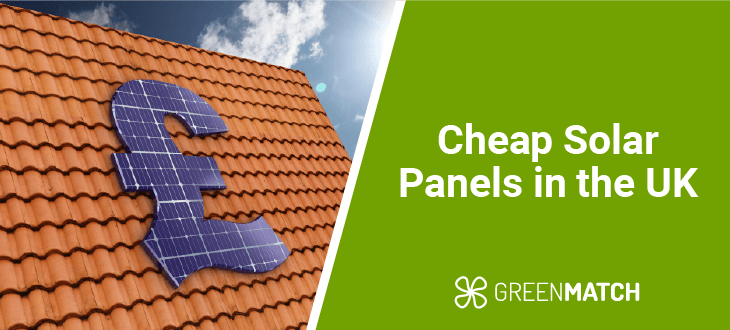
- Cheap solar panels in the UK typically range from £92 to £246 per panel.
- Low-cost solar panels are an affordable option for homeowners, yet their lower efficiency results in lower overall energy production which may lead to a slower payback period on your investment.
- Opt for cheap solar panels if you have a tight budget and your household energy consumption is relatively low.
Solar panels for homes have become a symbol of eco-conscious living, but the initial cost can be a real hurdle. Yet the good news is that cheap solar panels are a reality for homeowners. This article will explore low-cost solar panels, weighing their pros, cons, and upfront costs.
To choose the best solar panels for your home, you need to consult an experienced solar installer first. Yet while searching for a trusted expert, you can spend hours (if not days!) calling and vetting installers on your own.
Instead, why not take a stress-free route with GreenMatch? All you need to do is complete a 30-second form and you'll receive up to 4 free and non-binding quotes from local solar experts we've thoroughly vetted. Click the button below to get started.
- Quotes from local engineers
- Payment by finance available
- Save up to £1,110 per year
It only takes 30 seconds



How much are cheap solar panels in the UK?
Cheap solar panels in the UK typically cost between £92–£246 per unit, with the average cost of a 350-watt solar panel ranging between £150-£500.
| Solar company | Price range (per unit) |
|---|---|
| Amerisolar | £92–£188 |
| Suntech | £116–£193 |
| Jinko | £139–£177 |
| Longi Solar | £139–£246 |
| Premium solar panels | Up to £514 |
Estimate potential solar panel costs and savings based on your location using our solar panel calculator.
Cheaper panels, like those from Amerisolar and Longi Solar, range from £92 to £246 per unit. They offer an attractive entry point, balancing affordability with decent efficiency.
Premium panels, like SunPower's Maxeon series, come at a higher price tag (up to £514 per unit). However, they deliver superior value through higher efficiency and enhanced durability. Typically, premium panels last 25–30 years, while cheaper panels have a shorter expected lifespan – 15-20 years or less.
They boast a slower degradation rate (around 0.3–0.5% per year compared to 0.8% for cheaper options). This translates to maintaining higher efficiency for longer, maximising your return on investment.
Cheap solar panels vs premium solar panels: What are the differences?
When choosing between cheap and premium solar panels, it's important to factor in efficiency and degradation rate.
Solar panel efficiency refers to maximising output while minimising the energy used. Higher efficiency speeds up your break-even point and leads to higher annual savings.
Solar panel degradation, in turn, refers to the rate at which the performance of your solar panels reduces over time. Cheap solar panels generally have a higher degradation rate compared to premium options. The average degradation rate for cheap panels can range from 0.8% to 1.5% per year or even higher.
Here is a table comparing the key differences between cheap solar panels and premium solar panels in the UK:
| Feature | Cheap solar panels | Premium solar panels |
|---|---|---|
| Efficiency | 18–21% | 20–23% |
| System cost (4kW) | £5,000 - £6,000 | £4,000 - £5,000 |
| Warranty | 10–25 years | 25–30 years |
| Degradation rate (after 25 years) | 80% | 90% |
| Annual savings | £730 | £730 |
| Break-even point (average) | 5 years | 5 years |
| Manufacturer quality | Made by Tier 3 companies, no investment in research and development; assembly only. | Tier 1 and 2 companies with their own supply chains with heavy research and development |
| Examples | LONGi Solar, Jinko, Q-Cells, Trina | LG, Rec, Sunpower |
The trade-offs between upfront cost and long-term value are important when choosing between these options.
For example, budget solar panels use lower-grade materials and components that are more prone to issues like discolouration, faster degradation, and hot spots.
Hot spots are areas of high temperature that affect a solar cell by consuming energy instead of generating it. They occur when connections between photovoltaic cells face heightened resistance, causing disruptions across the entire string of cells. To avoid hot spots use quality panels, ensure proper ventilation, avoid shading, and ensure regular maintenance and cleaning.
The overall construction of cheap solar panels is poor. This includes the use of low-grade ethylene vinyl acetate (EVA) which degrades over time and results in lower energy production. Also, the back of the cheapest solar panels is often made from Tedlar (polyvinyl fluoride film trademark), which is prone to degradation and deterioration.
Moreover, the components mentioned above (EVA and polyvinyl fluoride film) can lead to issues like cracking and the formation of hot spots. Therefore, the inferior materials are less able to withstand harsh environmental conditions, especially high temperatures, leading to corrosion, delamination, and water leakage.
If you're still on the fence about which type of solar panels will work best for your house, it's best if you decide with an experienced solar engineer. They can walk you through how much solar panels in the UK cost. They can also recommend the ideal solar panel type to optimise your environmental impact and return on investment for your specific situation.
Yet searching for a trustworthy local solar expert on your own can drag on for days. And you might still be left with no actionable contacts at your fingertips.
Fortunately, we can do the heavy lifting for you!
Just complete our 30-second form and we'll connect you with up to 4 solar experts near you. Our offer is free and non-binding, simply click below to begin.
- Quotes from local engineers
- Payment by finance available
- Save up to £1,110 per year
It only takes 30 seconds



Pros and cons of cheap solar panels
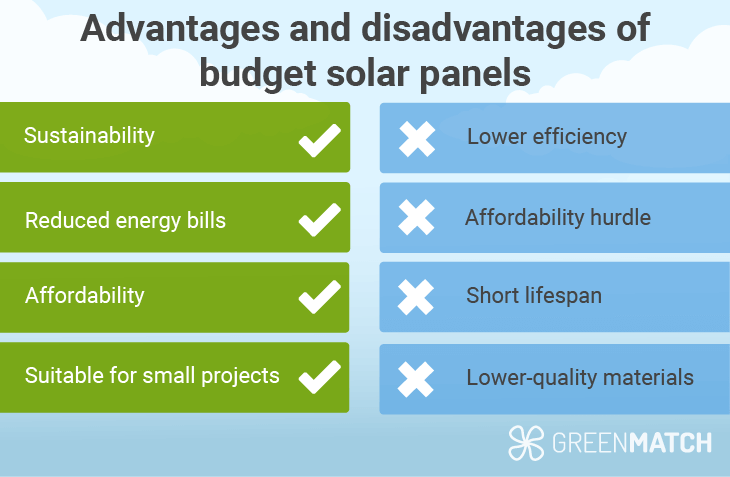
Let’s look at the main advantages and disadvantages of cheap solar panels in the UK.
Pros of cheap solar panels:
- Sustainability: Cheap solar panels still help reduce residential carbon emissions and make your home greener.
- Reduced energy bills: Installing cheap solar panels can help you save anywhere between £485–£1,110 on electricity bills, increase your home value, and lower your environmental impact.
- Affordability: Buying in bulk or looking for discounted solar panels can make them more affordable. Alternatively, you can choose between the solar panel grants to find financial assistance to cover some of the upfront costs.
- Suitable for small projects: If you have a smaller energy requirement, cheap solar panels could be sufficient for your needs.
Cons of cheap solar panels:
- Lower efficiency: Cheap solar panels are more likely to be less efficient, usually around 18–21% efficient rather than 20-23% efficient.
- Affordability hurdle: The upfront cost of solar panels, even cheap ones, is still a significant investment that may only be affordable for some homeowners.
- Short lifespan: Cheap solar panels may degrade faster than premium panels and have shorter lifespans of around 10–25 years.
- Lower-quality materials: Cheapest solar panel solutions may have lower quality, less efficiency, and require more frequent replacement compared to higher-end options.
Low-cost solar panels can be a cost-effective entry point for homeowners with lower electricity needs, particularly for a 4kW solar system or even a 5kW solar system, which is suitable for powering a 2-3 bedroom house. However, keep in mind the potential trade-offs in efficiency and lifespan compared to premium panels.
This is why buying solar panels for cheap without an installer is not recommended. A qualified installer can help you navigate potential trade-offs, such as ensuring you get enough panels to meet your energy demands despite their lower efficiency.
What are the best low-cost solar panels?
The following brands prove that even cheap solar options can hold their weight when it comes to the efficiency of solar panels. Let's look at the best-performing and most efficient solar panels in the budget category.
LONGi Hi-MO 405–425M – best low-cost solar panels with high efficiency
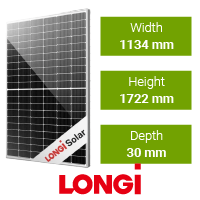
- Efficiency: 23%
- Cost: £1.90/watt
- Type: Monocrystalline
- Output power: 405W–425W
- Warranty: 12 years of product warranty, 25 years of performance warranty.
LONGi Hi-MO 405-425M boasts an impressive power output ranging from 405 watts to 425 watts, capable of generating substantial electricity for your needs. It incorporates p-type half-cut cells, which can potentially improve shade tolerance and power output compared to full-size cells.
Hi-MO 405-425M strikes a compelling balance by leveraging advanced PERC technology to achieve high efficiency and performance. And this is all while maintaining a more accessible price point compared to some premium solar panels on the market.
However, this model can't boast a high temperature coefficient and average product warranty which some homeowners might see as a drawback.
Trina Solar TSM-DE09C.05 – best low-cost solar panels with long warranty
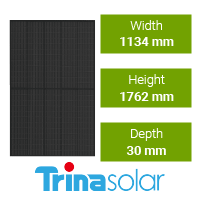
- Efficiency: 20–23%
- Cost: £2.20 per watt
- Type: Monocrystalline PERC technology
- Output power: 405W
- Warranty: 25 years of product and power warranty
Trina Solar TSM-DE09C.05 utilises innovative technology like high-density interconnect and multi-busbar design. This translates to achieving high efficiency and power output even within its compact 30mm-thin form factor.
Measuring 1754 x 1096 x 30 mm, this panel offers a space-saving design ideal for various installations. Trina Solar offers a reassuring 25-year product warranty and an equally long power warranty, guaranteeing at least 84.8% of initial output power even after 25 years.
Yet such high-quality solar technology and great warranty make Trina Solar panels more expensive than others, so factor this in when making your final decision.
Qcells Q.PEAK DUO ML-G10+ – best overall low-cost solar panel
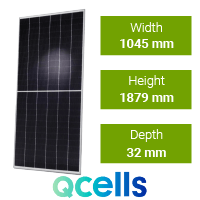
- Efficiency: >21.1% (395W), 20.6% (405W)
- Cost: £2.08 per watt
- Type: Monocrystalline Q.ANTUM DUO Z
- Output power: 395W; 405W
- Warranty: 25 years of product and performance warranty
Qcells Q.PEAK DUO ML-G10+ offers models ranging from 395W to 415W, all boasting efficiencies of over 20%. The panel incorporates monocrystalline Q.ANTUM half-cells with a zero-gap layout, contributing to its exceptional efficiency.
The frame is constructed from high-tech black anodised aluminium alloy, certified to withstand harsh weather conditions, including high snow and wind loads.
The panel has advanced technologies like Anti-LeTID, Anti-PID, and Hot-Spot Protect, ensuring long-lasting performance and yield security. The Qcells Q.PEAK DUO ML-G10+ is the first solar module to pass the rigorous "Quality Controlled PV" program by TÜV Rheinland, an independent certification institute.
Should you buy the cheapest solar panels in the UK?
Are solar panels worth it? Or, better said, are cheap solar panels worth it? Well, buying the cheapest solar panels in the UK can be tempting, especially if you're looking for an affordable way to go green. However, it's only sometimes the smartest choice in the long run.
While they offer a significant advantage upfront, especially on a tight budget, there are some trade-offs to consider. Cheap solar panel options might be less efficient at converting sunlight into electricity, meaning you'll generate less power and potentially wait longer to see a return on your investment.
Additionally, they may not be built to last as long as higher-quality options, leading to earlier replacements. Weaker warranties on cheaper panels could also leave you responsible for repairs or replacements sooner.
Lastly, due to their lower efficiency, you might need more cheap panels to achieve the same energy output as a system with higher-quality ones, potentially taking up more space on your roof.
Before you make your final decision, consider the following steps:
- Consider your budget: While upfront cost is important, factor in the potential for lower energy savings and earlier replacements with cheap panels.
- Think long-term: While a higher-quality panel might have a higher upfront cost, its efficiency and lifespan could make it more economical in the long run.
- Research the company: Choose a manufacturer with a proven track record for quality and reliability. Look for online reviews, industry awards, and warranty information. A company with strong financials is more likely to stand behind its products and honour warranties in the future.
- Check the warranties: Standard warranties for solar panels are typically 10–12 years. Look for extended warranties, as it signifies their confidence in product quality. Read the fine print of the warranty. Make sure it covers power output degradation over time and potential manufacturing defects.
- Get quotes: Talk to reputable solar installers and compare quotes that include different panel options. This will help you understand the cost difference and potential energy production for each option.
To simplify the often time-consuming task of finding reputable solar energy professionals, here at GreenMatch we can connect you with up to 4 certified solar experts and save you from hours of searching on your own. Just complete our 30-second online form to get started.
- Quotes from local engineers
- Payment by finance available
- Save up to £1,110 per year
It only takes 30 seconds



FAQ
LONGi solar panels are the cheapest solar panels in the UK, costing £1,90/watt. Yet, there are other cheap solar options available with longer warranties and better performance.
Yes, solar panels can be cheap. However, the quality of low cost solar panels might be made with lower-quality materials, impacting their durability and overall lifespan.
Cheap solar panels in the UK cost between £92–£246 and the prices vary depending on the specific model, efficiency, and brand. Consider consulting an experienced solar expert to find the best cost-effective solar solution for you.
We strive to connect our customers with the right product and supplier. Would you like to be part of GreenMatch?

